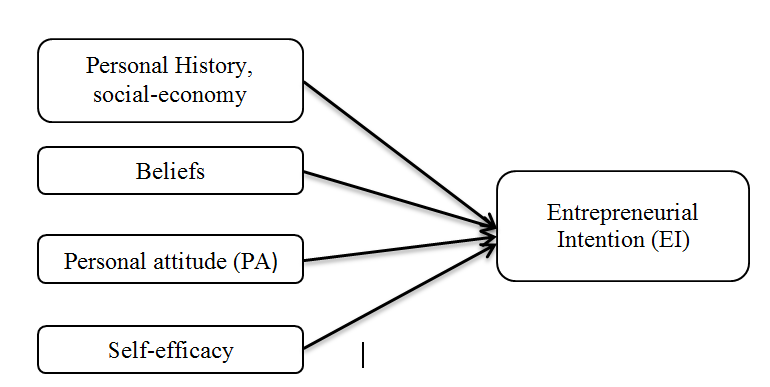Abstract
The main objective of this study is to investigate the effect of various personal traits on the entrepreneurship intentions of tourism vocational high schools students. The population of this study is 162 students and the sample is 114 students. The techniques used to collect data were questionnaires and interviews. The data was analyzed using descriptive statistics and inferential statistical analysis. The survey of 114 students from two different vocational high schools (SMK) in two different cities indicates the intention of entrepreneurship among students and the factors influencing it differ between schools. The results show that self-efficacy affects entrepreneurial intentions among students of SMKN 9 Bandung. Beliefs or self-confidence and personal attitude become the key factors affecting the intention of entrepreneurship among students of SMKN 2 Baleendah, Bandung. Background, age, and gender are no statistically significant contributors to students’ intention. This study is expected to be an input for schools, government agencies and policy makers to stimulate and encourage youth entrepreneurial interest.
Keywords: entrepreneurship intentions, beliefs, personal attitude, self-efficacy
1 Introduction
The Indonesian government released a regulation to develop entrepreneurship through the education program in general schools, vocational schools, and universities. The regulation for senior high school/vocational high school education is provided in the Instruction of President of Indonesia Republic No. 4 (1995) about the national movement of socializing and civilizing entrepreneurship. The Regulation of Educational and Cultural Ministry of Indonesia Republic about National Curriculum for Vocational High School (SMK) stated that entrepreneurship is included as a compulsory subject which needs to be studied in order to develop a creative economy and to alleviate unemployment.
Limited jobs increase unemployment. The problem faced by SMK is the decrease of the employed graduates in industry because of the unbalanced ratio between available jobs and the number of SMK graduates. The West Java Incorporated (2016) recorded the number of unemployed in 2015 and found that SMK graduates contributed 16.80%: the highest number among other levels of education. The increasing number of unemployed SMK graduates will make Indonesia conditions worse unless it can be solved soon.
A further challenge is the enactment of ASEAN Economic Community started on December 31, 2015. The enactment certainly will have both positive and negative impacts in employment. Therefore, entrepreneurship is one of rational alternatives for some of the young people who like to work independent as an entrepreneur.
One of the supporting factors of entrepreneurship is the learner’s interest which is called intention – a characteristic of an individual that directs a desire to perform a particular behavior.
2 Theoretical Review
2.1 Entrepreneurship Intention
Intention means one’s motive or desire to perform a particular behavior. Entrepreneurship intention also refers to a desire to build a business in the future (Ajzen 1991; van Gelderen 2008). Here, the term of entrepreneurship intention has same meaning as building a business or self-employment (Krueger 1993). Thus, it can be said that entrepreneurship intention is an indicator of one’s behavior of conducting a business. In this study, entrepreneurship intention means a reflection of one’s commitment to start building a new business as well as to develop and to institutionalize it. The business is to be conducted creatively, innovatively, independently, and ready to take risks in finding, creating, utilizing opportunities for advancement, and improving the business.
2.2 Factors Influencing Entrepreneurship Intention
Entrepreneurship is influenced by internal and external factors. Priyanto (2008) stated that internal factors come from the ‘inner entrepreneur’ including personal characteristics, attitude, interest, and ability, which are able to give an individual the power of entrepreneurship. Meanwhile, external factors come from the surrounding environment such as family, business environment, physical environment, and social-economy.
According to Krueger (1994), the model used to analyze factors influencing individual entrepreneurship intention is classified into three categories namely: individual or psychological factor, family-background factor, and social-environment factor. Wijaya (2007) concluded that factors influencing entrepreneurship intention were family, education, personal values, age, and sex.
Indarti and Rokhima (2008) stated that factors influencing entrepreneurship intention are: (a) personality factors including achievement need, self-efficacy, internal locus of control, and risk-taking; (b) environment factors including access to modal, information, social network, physical and institutional infrastructure, and culture; and (c) demographic factors including sex, age, educational background, parent’s occupation, and job experience.
Factors affecting the entrepreneurial intentions of students in vocational school in Indonesia, including behavior or attitude, attitude is considered as a first antecedent of behavior intention. Subjective norm is a second factor that is considered influential to the intention. The third factor that controls behavior, perceived behavioral control (PBC) is determined by two factors: control beliefs (beliefs about the ability to control), and perceived power (perceptions about power and control to perform a behavior) (Indarti & Rokhima 2008; Bandura 1968).
2.3 Model of Bird’s Contexts of Entrepreneurial Intentionality
Intention becomes a fundamental element to explain behavior. It shows one’s willingness to perform entrepreneurial behavior. Bird (1988, 1992) defined intention as one’s frame of mind focusing on attention, experience, and behavior towards a particular object or a particular behaving method. Bird also showed that entrepreneurship intention directs thinking and decisions to perception to find out correlation, resource, and effort.
Figure 1 describes Bird’s conception from entrepreneurship intention context. According to the scheme, individual tendency for entrepreneurship intention is based on personal and contextual factors. Bird’s model of entrepreneurial intentionality (1988) underpins that the individual’s firm decisions about business planning is based on the following five elements:
- Personal history, social context and economy. Sex, age, education, and family environment are included in this element. Sex can influence entrepreneurship intention because of the presence of different views on job between male and female. Entrepreneurship learning will shape students to build a career in entrepreneurship. Parents will share their views of life, support, spirit, and socialization pattern that will determine their children’s attitude, behavior, and education process.
 Figure 1: Model of Bird’s Context of Entrepreneurial Intentionality. The Influence of Self-Efficacy on the Development of Entrepreneurial Intentions and Actions (Bird 1994)
Figure 1: Model of Bird’s Context of Entrepreneurial Intentionality. The Influence of Self-Efficacy on the Development of Entrepreneurial Intentions and Actions (Bird 1994)
- Beliefs
- Rational analytic and intuitive holistic thinking. Furthermore, entrepreneurship intention is shaped by a rational or analytic thinking (behavior directed to purpose) and intuitive or holistic thinking in the form of a vision. The process underlies business planning, opportunity analysis, and other purpose-directed behavior.
- Personal attraction
- Self-efficacy
The five elements can grow student’s entrepreneurial intention. Bird (1988, 1992) defines intention as one’s frame of thinking focusing on attention, experience, and behavior toward a particular object or behaving method. Action in this concept states that a strong correlation between intention of conducting a particular behavior and actual performance of that behavior should be present. The factors influencing relation of intention and behavior, including to what extent they are measured at the same level, are specification, intention stability over time, and individual control of realizing the intention.
3 Method
3.1 Research Design
The research uses ex post facto method that investigates relationship between a variable and another or a variable influenced by a particular one. Ex post facto method is used to find the factors influencing the entrepreneurship intention of catering class students. The study uses entrepreneurial intention model developed by Bird (1988) namely Model of Bird’s Contexts of Entrepreneurial Intentionality as the research design. The illustration can be seen in Figure 2.
 Figure 2: Conceptual Frame of Entrepreneurship Intention (Bird 1988)
Figure 2: Conceptual Frame of Entrepreneurship Intention (Bird 1988)
3.2 Research Participants
The research participants are 114 twelfth graders of catering classes at SMKN 9 Bandung and SMKN 2 Baleendah, Bandung. The research was conducted based on purposive random sampling at two SMKs which administers catering skill programs in Bandung City.
3.3 Data Analysis
The research uses survey and questionnaire as the data collection techniques. The questionnaire about entrepreneurship intention was sent to SMK students of catering skill program of SMKN 9 Bandung and SMKN 2 Baleendah, Bandung. Then the data was analyzed descriptively and inferentially. The tests involve hypothesis testing by using path analysis.
3.4 Research Findings
The results obtained were based on path analysis suited to the constellation of research framework and show a positive direct influence from exogenous variables namely personal history, beliefs, personal attitude and self-efficacy to endogenous variables of entrepreneurial intention of tourism vocational school students.
- Personal history, social-economy (student’s background)
Personal history, social-economy has a positive influence to entrepreneurship intention since |tvalue| = 2.0698 > ttable = 1.9820. Thus, H0 is rejected, which means that personal history (X1) has less positive influence to entrepreneurship intention (Y). The result is supported by Indarti and Rokhima (2008), Rustiyaningsih (2013), Sumarsono (2013) who argued that sex, age, and education background have less influence to entrepreneurship intention. - Beliefs (self-confidence)
Beliefs (self-confidence) influence positively toward entrepreneurship intention. The hypothesis testing result of each school proves that |tvalue| = 3.0888 > ttable = 1.9820, which means that H0 is rejected. Therefore, beliefs (X2) give a direct positive influence to entrepreneurship intention (Y), as has been stated by Boyd (1994), and Rahayu(2011). - Personal attitude
Personal attitude is proved to give influence to entrepreneurship intention to the students of SMKN 9 Bandung and SMKN 2 Baleendah, Bandung. It is shown by |tvalue| = 3.1676 > ttable = 1.9820, which means that H0 is rejected. Thus, Personal Attitude (X3) gives a direct positive influence to entrepreneurship intention (Y). The result is supported by the study of Vemi (2012), Sidi (2015), and Agustina et al. (2011) who found a direct positive influence. It informs that entrepreneurship intention or starting a business can be strengthened if students are prepared with business knowledge and mental attitude development. Thus, they can have more interest and positive view of entrepreneurship. - Self-efficacy
Self-efficacy has less influence to the entrepreneurship intention of the students of SMKN 9 Bandung and SMKN 2 Baleendah, Bandung. It is shown by |tvalue| = 2.3422 > ttable = 1.9820; therefore, H0 is rejected. It means that there is a significant direct positive influence from self-efficacy (X4) to entrepreneurship intention (Y). It is supported by Suwarno (2010) who argued that the higher student’s self-efficacy to his entrepreneur ability, the higher his interest to be an entrepreneur. Self-efficacy has a positive influence to entrepreneurship intention, which parallels to the study of Bandura (1986) and Indarti and Rokhima (2008) to Indonesian, Japanese, and Norway students. They found that the most dominant factor which influences entrepreneurship intention is self-efficacy.
Entrepreneurship intentions are influenced by independent variables namely belief (confidence), personal attitude (attitude behavior), self-efficacy (self-efficacy). The average value of each variable can be seen in Figure 3 – it is the outcome of the survey done with the target group of 114 students.
 Figure 3: Graph Average Factors Entrepreneurship Intention learners SMKN 2 Baleendah Bandung and SMKN 9 Bandung
Figure 3: Graph Average Factors Entrepreneurship Intention learners SMKN 2 Baleendah Bandung and SMKN 9 Bandung
4 Discussions
The purpose of this research is to find the variables influencing entrepreneurship intention. The result shows that entrepreneurship intention is influenced by some independent variables namely belief, personal attitude, and self-efficacy. Many students of SMKN 2 Baleendah still felt of being an entrepreneur.
SMKN 2 Baleendah Bandung had a mission of educating their graduates to be an entrepreneur, to have a global knowledge, to be independent, competitive, and ready to create jobs. However, SMKN 2 Baleendah should continuously improve the students’ interest in entrepreneurship. The uncertainty felt by them is caused by more emphasis on readiness to enter job world rather than to prepare them as an entrepreneur.
SMKN 9 Bandung had facilities that can support teaching-learning process, to develop the students’ interest and talent. Each study program had laboratory where the practice is conducted to develop students’ entrepreneurship by utilizing the present skills and potentials. SMKN 9 Bandung was chosen to be one of the tourism vocational school model which got support from Educational and Cultural Ministry. They had a hotel which is eligible to be a business. SMKN 9 Bandung was developing the practical facilities for the students in the form of star hotel development. The hotel was across from the school, named Edotel Metro Bandung.
5 Conclusion and Recommendations
The conclusions of the research are as follows.
The research outcomes say that the factors influencing entrepreneurship intention of SMKN 9 Bandung students and SMKN 2 Baleendah students are different. The survey conducted to 114 students from two different SMK in two different cities shows that self-efficacy influences entrepreneurship intention of SMKN 9 Bandung students. Beliefs and personal attitude become the key factors which influences the entrepreneurship intention of the students of SMKN 2 Baleendah, Bandung. Nevertheless, background, age, and sex are statistically not significant.
The direct positive influence from beliefs, personal attitude, and self-efficacy to the entrepreneurship intention of tourism vocational school students means that the high or low entrepreneurship intention is determined a lot by student’s beliefs, personal attitude and self-efficacy. The higher the factors, the higher the entrepreneurship intention.
Recommendations are expected to be useful for the institutions, in this case education authorities, schools and for further research, as follows:
1. Based on the research we recommend to Dinas Pendidikan Kota/ Kabupaten Bandung to give an appreciation of the schools that have developed entrepreneurship in schools as well as in the area. Thus schools ranging from school principals, teachers, and learners are motivated to develop entrepreneurial activities both in school and outside of school.
2. For Schools:
SMKN 9 Bandung
The results showed determinants of intention entrepreneurship learners SMKN 9 Bandung is the belief (confidence), therefore the teacher craft entrepreneurship and business management are expected to instill confidence (self-efficacy) were strong on the learner through the application of appropriate learning methods in learning in order to foster interest learners to want to entrepreneurship, and the new innovations in learning.
SMKN 2 Baleendah Bandung
Determinants of intention entrepreneurship learners SMKN 2 Baleendah Bandung is self-efficacy and personal attitude, and therefore teachers craft entrepreneurship and business management are expected to instill confidence through the application of appropriate learning methods in learning in order to attract learners to want to entrepreneurship and their new innovations in learning. The higher the confidence of learners on her ability to be sought, the greater the desire to become an entrepreneur.
For Further Research
The suggestions for the next researcher who is interested in studying entrepreneurship intention vocational school students are expected to be able to examine the determining factors other than belief, personal attitude and self efficacy that can affect entrepreneurial intentions, using other research methods.
References
Ajzen, I. (1991). The Theory of Planned Behavior. In: Organizational Behavior and Human Decision Processes, 50, 179-211. Online: https://pdfs.semanticscholar.org/6256/ca4853f44ab9acb98f91f0d7848c54185ca7.pdf (retrieved 05.11.2016).
Bandura, A. (1986). Social Foundation of Thought and Action. Englewood Clift: Prentice Hall.
Bird, B. (1988). Implementing Entrepreneurial Ideas: The Case for Intentions. In: Academy of Management Review, 13, 3, 442-453.
Bird, B. (1992). The Operation of Intentions in time: The Emergence of the New Venture. In: Entrepreneurship Theory and Practice, 17, 1, 11-20.
Boyd, N. & Vozikis, S. (1994). The Influence of Self-Efficacy on the Development of Entrepreneurial Intentions and Actions. In: Entrepreneurship Theory and Practice, 18, 4, 63-77.
Cynthia, A. (2011). Intensi Kewirausahaan Mahasiswa, Studi Perbandingan antara Fakultas Ekonomi dan Fakultas Ilmu Komputer. Economy Faculty, Gunadarma University. Online: http://library.gunadarma.ac.id/repository/view/17811/intensi-kewirausahaan-mahasiswa-studi-perbandingan-antara-fakultas-ekonomi-dan-fakultas-ilmu-komputer.html/ (retrieved 07.11.2016).
Indarti, N. & Rokhima, R. (2008). Intensi Kewiausahaan Mahasiswa, studi perbandingan antara Indoensia, Jepang dan Norwegia. In: Jurnal Ekonomi dan Bisnis, 23, 4, 369-384.
Krueger, N. & Brazeal, D. (1994). Entrepreneurial Potential and Potential Entrepreneurs. In: Entrepreneurship Theory and Practice, 18, 3, 91-104.
Krueger, N. & Carsrud, A. (1993). Entrepreneurial Intentions: Applying the Theory of Planned Behavior. In: Entrepreneurship & Regional Development, 5, 4, 315-330.
Presidential Instruction No. 4 of the Republic of Indonesia (1995). Gerakan nasional memasyarakatkan dan membudayakan kewirausahaan (National movement to socialize and civilize entrepreneurship).
Priyanto, S. (2008). Di dalam Jiwa ada Jiwa: The Backbone and the Social Construction of Entrepreneurships. Online: http://repository.uksw.edu/bitstream/123456789/346/2/OGB_Sony%20Heru%20Utomo_Di%20dalam%20jiwa%20ada%20jiwa_Full%20text.pdf (retrieved 05.11.2016).
Rahayu, M., Novadjaja, L. & Indrawati, N. (2011). Intensi Berwirausaha pada Mahasiswa Baru. In: Jurnal Aplikasi Manajemen, 9, 2, 329-339.
Rustiyaningsih, S. (2013). Faktor – Faktor yang Mempengaruhi Intensi Kewirausahaan. In: IPI Widya Warta, 255-267. Online: http://download.portalgaruda.org/article.php?article=116808&val=5324 (retrieved 02.12.2016).
Sidi, Z. (2015). Analisis Faktor-faktor yang mempengaruhi Intensi Berwirausaha Pada Mahasiswa Universitas Brawijaya.
Sumarsono, H. (2013). Faktor-faktor Yang Mempengaruhi Intensi Wirausaha Mahasiswa Universitas Muhamadiyah Ponorogo. In: Jurnal Ekuilibrium, 11, 2, 62-88. Online: http://journal.umpo.ac.id/index.php/ekuilibrium/article/view/35/32 (retrieved 02.12.2016).
Suwarno, I. (2010). Intensi Kewirausahaan Pada Mahasiswa –Mahasiswa di Indonesia. In: IPI. Online: http://id.portalgaruda.org/?ref=browse&mod=viewarticle&article=386948 (retrieved 26.11.2016).
Van Gelderen, M. et al. (2008). Explaining Entrepreneurship Intentions by Means of the Theories of Planned Behavior. In: Career Development International, 13, 6, 538-559.
Vemmy, C. (2012). Faktor-faktor yang mempengaruhi Intensi berwirausaha siswa SMK. In: Jurnal Pendidikan Vokasi, 2, 1. Online: http://journal.uny.ac.id/index.php/jpv/article/view/1022 (retrieved 07.12.2016).
West Java Incorporated (2016). West Java in Figures 2015. Online http://www.westjavainc.org/wp-content/uploads/2016/06/Jawa-Barat-Dalam-Angka-2015_opt.pdf?bf98dc (retrieved 04.12.2016).
Wijaya, T. (2007). Hubungan Adversity Intelligence dengan Intensi Berwirausaha (An Empirical Study to the Students of SMKN 7 Yogyakarta). In: Jurnal Manajemen Dan Kewirausahaan, 9, 2, 117-127.
Citation
Ana, A., Rostika, Y., Juwaedah, A., Setiadi, A., & Hardikusumah, I. (2017). The Effect of Personal Traits on Entrepreneurship Intention of Students at Tourism Vocational High Schools in Bandung. In: TVET@Asia, issue 8, 1-11. Online: https://www.tvet-online.asia/issue8/ana_etal_tvet8.pdf (retrieved 29.01.2017).





